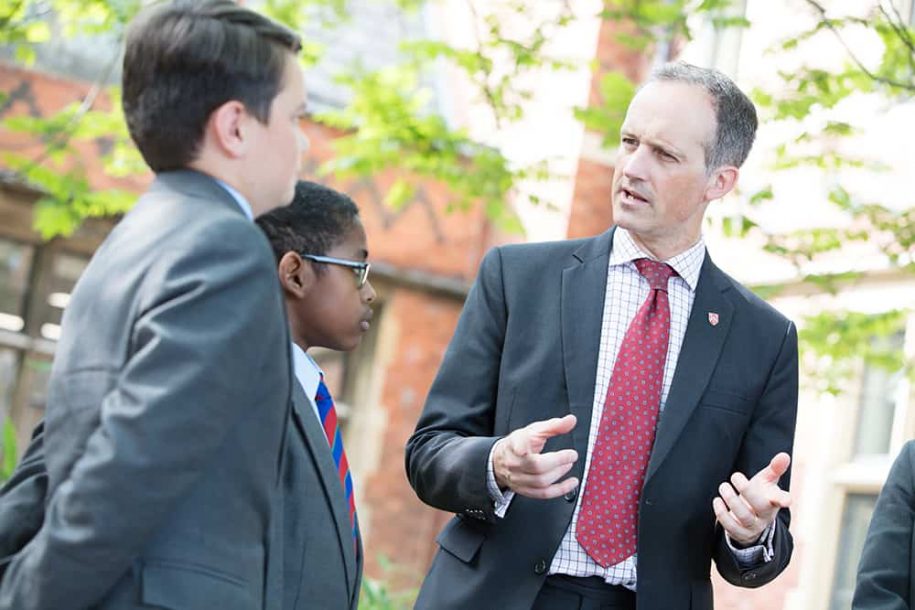The Power of Music

The last decade has seen an increase in the profile of STEM subjects in the curriculum as a direct consequence of systematic Government promotion. This drive has been successful as the number of pupils taking A Levels in Mathematics and the sciences has grown consistently. Naturally, there have been consequences for other academic disciplines. The creative arts have suffered across the country, particularly in the maintained sector with the budgets of county music services slashed and pupils’ GCSE options reduced to meet the Government’s focus on the ‘EBacc’ subjects. At the Grammar School, we have bucked this trend to an extent, as we are able to provide appropriate resourcing in the way that squeezed primaries or academies might not be able to. However, there is still the risk that we consider art, drama or music to be only leisure pursuits, and this ignores the reality that Britain is a world leader in the creative arts. They do not only contribute billions annually to our economy but also develop skills and attitudes which are invaluable to our sons’ future success and happiness.
Why has our Western liberal education developed to make music (or art and drama for that matter) an integral part of the curriculum? Why do all the LSF schools continue to value regular exposure to the creative arts as the maintained sector concentrates increasingly on a narrower diet?
We are fortunate to have a sector-leading Music Department, formed a decade ago when the resources of the 4 schools in the Foundation were merged. As part of its impressive extension programme, the LSF Music Department boasts stimulating lectures and masterclasses that run after school on Friday afternoons, featuring a broad range of composers, performers and academics. Earlier this term, I attended a lecture given by Professor Susan Hallam, Professor of Education and Music Psychology at University College London, on the ‘Power of Music’. A large part of her presentation looked at the research that has been carried out over the past 30 years on the impact of learning a musical instrument on children’s development, whether in terms of IQ, emotional intelligence and interpersonal skills or mental health. These insights help to answer the questions posed above.
I have long been convinced by the broad benefits of active engagement in music-making. In all of the schools in which I have worked, those pupils involved in co-curricular music have achieved consistently superior examination results. Of course, I have been aware that my small samples do not prove a causal link. It may be that pupils who are able to show greater academic concentration and thereby achievement are more likely to demonstrate the concentration to stick with an instrument. However, Professor Hallam’s lecture gave me, for the first time, the research evidence to back up my casual observations. It turns out that research consistently shows that learning an instrumental confers benefits for intellectual development. For example, musicians acquire greater phonological awareness that translates into improved reading skills. Similarly, increases in IQ are more pronounced in those learning musical instruments in the 9-13 age range.
Other areas of development also benefit. For example, research has found musicians to be more adept at reading the emotions of others, leading to a more profound ability to build healthy relationships. In addition, singers and wind players develop good posture and effective breathing which both have health benefits and help to reduce stress. Finally, children who learn instruments develop greater powers of concentration, due to the rigours of regular practice. They accept delayed gratification and are therefore less impulsive and better able to focus on long-term goals.
Although you may not have been aware of the evidence, parents seem to have an instinctive understanding in the second half of primary education that learning a musical instrument is beneficial to their children’s development. Unfortunately, as many of you will have discovered, early adolescence is a time when many give up on music. Motivation can waver at the grade 5 level, when technical difficulty increases and progress without practice becomes impossible. Experience suggests, however, that if you can help your son to overcome this mental hurdle, positive practice habits soon become engrained – with broader intellectual benefits. The complex network of benefits explains why we promote music for all. For some years now, all Year 2 pupils in Fairfield have learned a stringed instrument, and we insist that all Year 7 boys and girls sing in the De Montfort Hall concert each March. (And, for that matter, all boys appear on stage in the Year 7 pantomime.) Even if this is the last time that LGS boys contribute to school music and drama, they have at least had the experience of being in front of a huge audience, and some, of course, will catch the performance bug.
There are a number of LGS alumni who are perfect examples of how the UK leads the world in the creative arts, such as electronic musician Felix Buxton (1988), film director Amit Gupta (1991) and folk musician Sam Sweeney (2007). Their early artistic experiences at LGS, and elsewhere, ignited a lifelong passion. Our educational vision is to expose boys to as many influences and experiences as possible in order to help them discover where they are in their element. I forget where this quotation comes from but I am in complete agreement with its sentiment:
